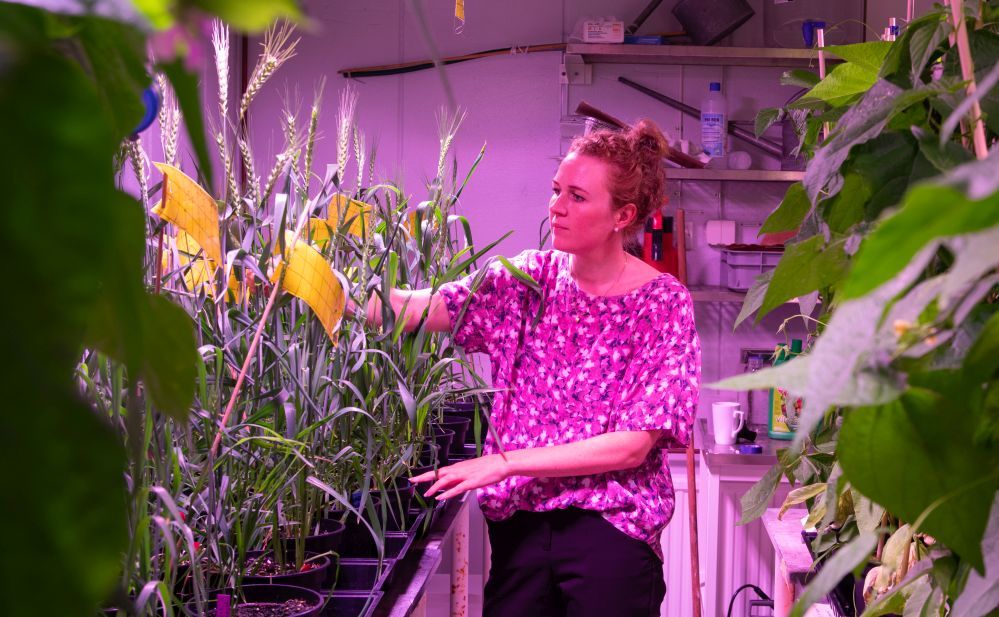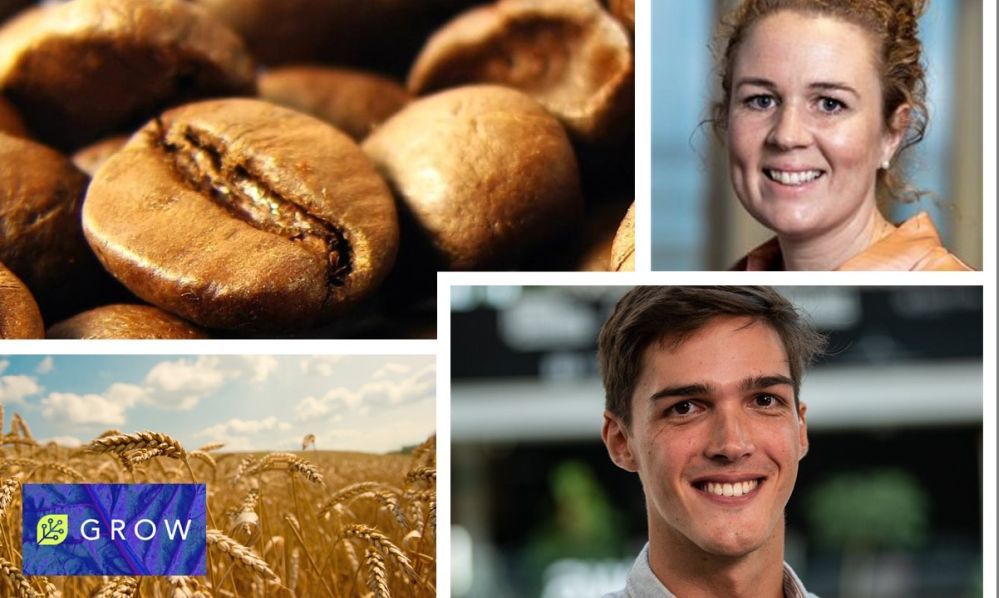Pressure to breed ‘climate smart’ crops—from salt tolerant rice to heat-tolerant tomatoes—is rising as farmers battle rising soil salinity, higher temperatures, and more erratic weather. But traditional crop breeding can take decades to bear fruit, while transgenic crops face regulatory and cultural barriers.
Two startups out of 10 chosen from 600+ applicants for the 2023 cohort of AgFunder’s GROW impact accelerator are adopting approaches they believe can both accelerate the breeding process for climate-resilient crops and ease their regulatory path.
- OlsAro (Sweden) is developing climate-adapted crops using AI-enabled trait discovery; while
- Amatera (France) is accelerating the breeding of climate-resilient perennial crops including coffee.
“In the past, plant biotechnology focused mainly on enhancing yield, taste, and other sensory attributes,” says Ryan Lee, associate at AgFunder and part of the selection committee for GROW. “However, there is a growing trend towards prioritizing ‘climate resilience’ as a key trait in response to the imminent challenges posed by climate change.”

Amatera: Robusta, minus the bitterness; and Arabica, minus the caffeine
Cofounded in May 2022 by Omar Dekkiche (CEO) and Dr. Lucie Kriegshauser, who met through Entrepreneur First, a platform bringing together founders in multiple fields, Amatera’s accelerated trait discovery and plant breeding platform “has the potential to develop more climate resilient crops and go to market more quickly than [companies using] traditional breeding methods,” claims AgFunder’s Ryan Lee.
The Paris-based startup’s first target is the world’s second-most consumed beverage, coffee, a crop that is attracting significant attention in the agrifoodtech field as climate change negatively impacts yields and reduces the land available for cultivation.
Right now, Amatera has two breeding programs. The first is a variety of Robusta without the bitterness that has traditionally forced the more robust and climate-resilient coffee variety to play second fiddle to Arabica. The second is an Arabica variety that is naturally caffeine-free.
Plant cell culture combined with accelerated natural evolution process
In both cases, Amatera is using plant cell culture (growing plant cells in vitro in culture rather than growing mature plants in water or soil) to develop its varieties, inducing spontaneous genetic variation using physical and chemical approaches, but without deploying gene editing or traditional GM techniques, Dekkiche tells AgFunderNews.
“Combining in vitro plant cell culture with our accelerated natural evolution process is new as most companies are focused on seeds or gene editing. We work with cells and then once we have what we want, we can regenerate a plant that can grow in the field.”
He adds: “Coffee is under threat but today it can take more than 20 years to create a new coffee variety with conventional breeding techniques. We are accelerating the breeding of perennial crops including coffee to create new varieties much faster such as a Robusta that tastes like an Arabica. We’re also developing an Arabica variety that is naturally caffeine-free, which saves a huge amount of time, money and energy, as the standard way to decaffeinate coffee is by rinsing beans with a chemical solvent.”
“Our approach is based on accelerating the natural evolution of the plant, so we are not editing the genome, but accelerating natural evolution by identifying at the cellular level the line that has mutated in the way that we want, whether it’s to have less bitterness, or no caffeine.
“We are non-GMO and we don’t need to get regulatory approvals to put our varieties on the market and commercially sell the beans. So that’s a big advantage.”
While there are several coffee species that are naturally caffeine-free that could potentially be developed, they don’t have the taste or agronomic performance of Arabica, he points out.
First production in 2027
So what progress has Amatera made so far?
Dekkiche, who is expanding the team this year with experts in cell biology and molecular biology, explains: “We aim to have all our development at a cellular level [in plant cell culture] done by the end of 2024 and then we’ll start producing the beans in the field, and that will take at least two years, and so we expect first production by 2027.”
But how does Amatera know whether the new varieties will have the same yields and performance the industry requires?
According to Dekkiche: “We know the genes that are responsible for the bitterness or the caffeine, so we are able to be highly selective and we don’t see these impacting other aspects of the plants’ growth.”
As for the business model, there are two approaches, he says. The first is to license varieties to coffee trading houses, and the second is to develop new varieties—spanning everything from coffee to cacao, bananas and grapes—in partnership with large food companies.

OlsAro: Salt-tolerant, heat-tolerant wheat
Cofounded in 2013 by molecular biologists Henrik Aronsson and Olof Olsson, OlsAro (based in Göteborg, Sweden) is developing more climate-resilient crops using AI-enabled trait discovery.
“Affordable wheat is key to food security in many parts of the world,” says AgFunder senior investment associate Angela Tay. “The war in Ukraine has disrupted the supply chain so we need to look at alternative regions to grow wheat and other crops more sustainably.
“Asia has lots of land for crop growing but it also has a super long coastline where previously arable land is now no longer farmable due to rising salinity. There’s an urgent need to develop crop species which are salt-tolerant, and this is one of the key areas of expertise at OlsAro. We also love that they are a Swedish company with strong interest in transferring that technology to be applied in Asia.”
According to OlsAro CEO Elén Faxö: “I was brought in a couple of years ago to bring in money and focus on the commercial side of the business, which secured €580,000 ($620,000) pre-seed in early 2022 and we’re currently looking to raise €2 million ($2.14 million).”
She adds: “We’re seeing a steady reduction in the amount of cultivatable land due to soil salinity, which can mean lower yields or [at worst] no growth at all. This [higher salinity] is in part due to flooding and cyclones, but also due to the lack of freshwater, where farmers have been irrigating with saline water or brackish water, so it’s a huge addressable market.”
“In Bangladesh, our focus is on making unfarmed land farmable again, so we’ve got three years of field trials, and compared to the control of moderately salt-tolerant wheat, we have a 52% higher yield.
“During the dry season, the salt gets even more concentrated and farmers don’t cultivate. So with our salt-tolerant wheat, we can make an additional crop season possible. We have a commercial contract in place with a seed company headquartered in Bangladesh, but we are not out on the market yet, as we have the standard regulatory process ahead of us. We are also in commercial dialogs regarding Pakistan and Oman as markets for salt-tolerant wheat lines and regarding heat-tolerant wheat for Bangladesh.”
Two development paths depending on regulatory landscape
While a fair amount of work has gone into research on salt tolerant crops, there are “not many valid commercial options on the wheat side,” claims Faxö, who says OlsAro is also working on developing crops that are more heat-tolerant and have improved nitrogen efficiency, which would reduce dependence on synthetic fertilizers.
According to Faxö, OlsAro has two development paths depending on the regulatory landscape in markets it is targeting.
“The first is what we call line development,” she says. “So we have a population that is treated by EMS mutagenesis, where we treat the seeds with a specific substance to introduce very high genetic diversity. We have a proprietary population of over 2,000 wheat lines with very high genetic diversity. We can then commercialize lines moving into new varieties from screening in our population. From the phenotypic screening we know that we have the [desired] trait.
“But [in OlsAro’s second development path] we can also [identify the] genetic coding that gave rise to this specific trait and develop genetic events, SNPs [single nucleotide polymorphisms or genetic variations] for our specific trait of interest and that in turn, can also be inserted via gene editing.”
Underpinning this is a “database of genomic data, field data, transcriptomics and so on. And then we also have AI that enables us to speed development that we are continuously building on,” says Faxö.
“We use machine learning to screen down on the SNPs of interest for salt tolerance, so we expect to have the first SNP for salt tolerance identified by the beginning of next year. And then the next step once we have that in place, is to go for gene editing of local elite varieties.”
She adds: “We’ve done field trials in Pakistan, Serbia, and Kenya, and it seems like our seeds is well adapted also for these conditions. However, we cannot be sure, and that’s one reason why we’re also looking at gene editing, because this would enable us to work with local [wheat] varieties that are already adapted for local conditions.”
‘We expect to generate revenues from 2025-2026’
So what is OlsAro’s business model, and aren’t all the major seed companies working on salt tolerance in-house?
“So we’re a seed pre-breeder, so our customers are the seed companies,” says Faxö. “I’d say they haven’t all woken up yet to this challenge but many of them now recognize it is huge. Our partner in Bangladesh for example is a player that reaches 10 million farmers and they have a focus on soil salinity, because it’s a huge issue in many of their markets.”
So can OlsAro’s work on salt tolerance in wheat translate to other crops?
According to Faxö: “It is a matter of looking at what genes there are changes in and if there’s a homology in the genes that are changed [in wheat] with other crops, which is very likely, especially for other grains.”
She adds: “We expect to generate revenues from 2025-2026. The reason we’re not generating them already is because we’re going through regulatory approvals and also that we need to propagate and multiply the seeds so we have sufficient amounts to bring to market.”
GROW: The 2023 cohort
The AgFunder GROW Impact Accelerator launched in 2019 with the aim of supporting the growth of emerging technologies in the agrifood space while strengthening their efforts towards sustainability.
For the 2023 cohort, 10 companies were chosen from over 600 applicants to join the 20-week program, which comes with a $100,000 investment in each company from AgFunder along with access to AgFunder’s co-investors and GROW’s network.
Connect with the startups here.
Further reading:
3 agtech startups bringing financial inclusion to farmers in Asia Pacific
The AgFunder GROW Impact Accelerator announces 2023 cohort of agrifoodtech startups





